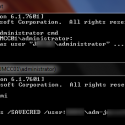Hopefully this may help someone else out there who is looking for a good excuse to use Fabric in anger. I install Fabric on my local Ubuntu desktop using:
sudo apt-get install fabric
With Fabric installed I created a new directory for playing around and inside that folder created a file named fabfile.py as follows:
from fabric.api import local, env, run
env.user = "jonny"
env.hosts = [
'mailhost1',
'mailhost2',
'mailhost3'
]
def uptime():
run('uptime')
With the file saved I ran it is as follows:
fab uptime
Fabric executes the uptime command on each of the specified hosts. and I can see/parse the output. No big deal?
Note 1: A prerequisite of the above is that you have used ssh-copy-id to each of the hosts you want to use (if you don’t understand this read up about it)
Note 2: A prerequisite of the below use of sudo is adding a line such as:
jonny ALL=(ALL) NOPASSWD: ALL
to the /etc/sudoers file on each host you want to manipulate using sudo/root commands. This can be time consuming but worth it in the long run.
So today I wanted to replace syslog with rsyslog, amend the rsyslog.conf file and start/stop the appropriate services so that syslogs are sent from 30 servers to a central syslog server.
I created a directory ‘deploy_rsyslog’ and in it created fabfile.py as follows:
from fabric.api import local, env, put, run, sudo, cd
env.hosts = [
'hostname1',
'hostname2',
'hostname3',
'hostname29',
'hostname30',
'hostname31'
]
def deploy_rsyslog():
sudo("yum -y install rsyslog rsyslog-mysql")
with cd('/etc'):
put('rsyslog.conf', '/etc', use_sudo=True)
sudo("if [ -e /etc/init.d/syslog ]; then /sbin/chkconfig syslog off; fi")
sudo("/sbin/chkconfig rsyslog on")
sudo("if [ -e /etc/init.d/syslog ]; then /etc/init.d/syslog stop; fi")
sudo("/etc/init.d/rsyslog start")
I also created a file rsyslog.conf in this same directory to be uploaded(put) to each server.
I ran the script as:
fab deploy_rsyslog
Points to notice:
- We need to import functionality for put, sudo etc otherwise we get an error “NameError: global name ‘cd’ is not defined”
- When putting my conf file I need to use_sudo=True as I do not have write permissions to /etc as my normal user
- To reduce errors I wrapped some if logic around commands to ensure the commands are only run if necessary. Otherwise the whole script stops if a host does not have the SysV script for syslog
Conclusion:
Fabric appears to be a pretty useful tool in the armoury not just for saving time but for creating a library of repeatable deployment scripts.

